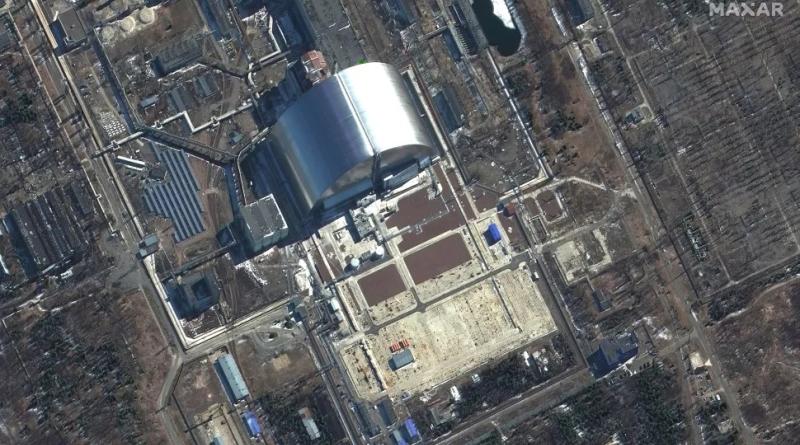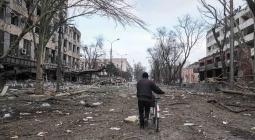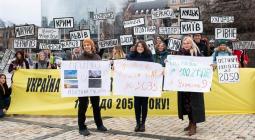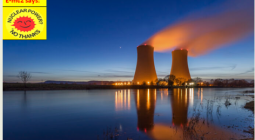Ukraine invasion's impacts on the world of science

Russia launched a war against Ukraine on Feb. 24, 2022, targeting more than a dozen cities and the Chernobyl nuclear site within the first day of the invasion.
The ongoing war not only threatens Ukraine's continued existence as an independent country, but the conflict will likely have wide-reaching ramifications for science-related industries and organizations the world over. In addition, the potential for nuclear war and damage to Ukraine's various nuclear sites pose a threat to public health and the environment, on a global scale.
"Now, Putin’s back is against the wall," Biden said. "And the more his back is against the wall, the greater the severity of the tactics he may employ."
Russia has asserted — without evidence — that the U.S. and Ukraine have biological and chemical weapons, Biden noted. "That’s a clear sign he [Putin] is considering using both of those. He’s already used chemical weapons in the past, and we should be careful … of what’s about to come."
In addition, Russia may soon execute cyberattacks against critical U.S. infrastructure, Biden said. "The magnitude of Russia’s cyber capacity is fairly consequential, and it’s coming," he said. "The federal government is doing its part to get ready."
The trees around the Chernobyl nuclear power plant still hold loads of radiation absorbed during the 1986 nuclear meltdown, considered one of the world's worst nuclear disasters.
Since Feb. 25, Russian forces have occupied the power plant and the surrounding exclusion zone, taking plant employees hostage. This seizure and related fighting put the forest at an increased risk of catching fire, according to William Keeton, a forest ecosystem scientist at the University of Vermont. Such a fire would release potentially dangerous radiation into the atmosphere.
When the nuclear reactor "melted down" on April 26, 1986, it launched radionuclides across an area of about 58,000 square miles, according to Smithsonian Magazine. Some of that radiation washed down to the ground in rain, only to be taken up by growing trees. Those trees now store all of those radionuclides.
"These forests absorbed tremendous amounts of radiation during the 1986 disaster, and the trees and soils still contain significant radiation — in the form of large amounts of radioactive elements called radionuclides," Keeton said in a statement. If a forest fire happens — from a bomb, explosion or fire — this radiation could be released into the atmosphere.
The forest there is mostly coniferous, which includes relatively fire-prone types of trees, Keeton said. Because of that risk, the U.S. Forest Service and Ukrainian experts have worked together to manage the fire risk. With Russian occupation, that capacity has dwindled. In addition, the forests are near the warzone, meaning risks from gunfire, explosions and even power line damage, Keeton explained.
Forest fires in the exclusion zone are not unheard of. In April of 2020, about 50 acres (20 hectares) of forest caught fire near the abandoned village of Vladimirovka in Ukraine's exclusion zone, Live Science previously reported. Water drops from aircraft and a 124-person strong firefighting force were needed to put out that blaze.
The Park XII Months zoo, located about 15.5 miles (25 kilometers) north of Kyiv in Ukraine, has requested that a humanitarian corridor be established to allow some of its animals to be evacuated, The Independent reported. For large animals that are difficult to transport, such as the rhinos and giraffes, the zoo staff hope that such corridors could serve as transport routes for food and fuel to heat the animals' enclosures.
"We need green corridors to bring in diesel, heat, and feed them. We can’t take out rhinos and giraffes, big animals, we don’t even have medicine to put them to sleep. We need to negotiate green corridors," Mykhailo Pinchuk, the zoo's owner, said in a recent Facebook video, according to The Independent.
Since the start of the war, various humanitarian corridors have been established to allow tens of thousands of people to evacuate Ukraine, The Washington Post reported. However, these corridors have often been made impassable by ongoing Russian attacks, Ukrainian officials have said.
In response to Russia's invasion of Ukraine, countries must not only decrease their reliance on Russian oil and gas but also heavily invest in renewable energy sources, António Guterres, the Secretary-General of the United Nations (UN), said in an address on Monday (March 21), The Guardian reported.
It would be folly to invest in new fossil fuel infrastructure to make up for the loss of Russian resources, as doing so "might create long-term fossil fuel dependence and close the window to 1.5C," the goal set forth at the Cop26 UN climate summit last year, he said. "Countries could become so consumed by the immediate fossil fuel supply gap that they neglect or knee-cap policies to cut fossil fuel use."
Average global temperatures have already increased more than 1.8 degrees Fahrenheit (1 degree Celsius) since the pre-industrial era, The Washington Post reported. Estimates suggest that the world could pass the 2.7 F (1.5 C) cutoff by the 2030s, if critical action is not taken now.
"If we continue with more of the same, we can kiss 1.5 goodbye. Even 2 degrees may be out of reach," Guterres said Monday, according to the Post.
An ammonia leak at a chemical factory near the northern Ukrainian town of Novoselytsya has led officials to urge residents to take shelter, all amidst the intense fighting with Russian armed forces in the area, according to news reports.
The ammonia leak came from the Sumykhimprom fertilizer plant, the Sumy regional governor Dmytro Zhyvytsky said, as reported by Al Jazeera. Shelling from Russian forces caused the leak, he added, and wounded an employee at the plant.
The Russian army has said otherwise, calling the ammonia leak a "chemical false flag." Russian army spokesperson Igor Konashenkov said, “The Russian army has not planned or delivered any strikes against Ukrainian facilities that manufacture or keep in store poisonous chemicals," Al Jazeera quoted him.
Ammonia is a highly toxic gas made of nitrogen and hydrogen that produces a noxious odor. To produce the compound, plants utilize a chemical reaction of both elements at high temperature and pressure, according to the American Chemical Society. About 85% of the world's ammonia production is used directly or indirectly in agriculture, according to the ACS. The most common household use of the chemical is in glass cleaners. According to the ACS, exposure to the gas can cause severe skin burns and eye damage; it is toxic if inhaled and under pressure the gas can explode when heated.
The bright-yellow and blue flight suits donned by a trio of Russian cosmonauts as they boarded the International Space Station on Friday (March 18) appeared to be a sign of their support for Ukraine, whose flag is the same colors, some outsiders had said. Now, Russia has scoffed at that interpretation.
The three cosmonauts, Oleg Artemyev, Denis Matveev and Sergey Korsakov, joined seven crewmates already onboard the ISS. On Saturday (March 19), the Russian space agency released a statement quoting Artemyev: "There is no need to look for any hidden signs or symbols in our uniform. A colour is simply a colour. It is not in any way connected to Ukraine. Otherwise, we would have to recognise its rights to the yellow sun in the blue sky," Artemyev said, as reported by The Guardian. "These days, even though we are in space, we are together with our president and our people!"
Even so, on Friday, Artemyev had explained the color choice with a different rationale, saying the team chose the bright yellow because there was so much of that material in storage, explaining "that’s why we had to wear yellow," The Guardian reported.
Russian president Vladimir Putin claimed the country has deployed its newest Kinzhal hypersonic missiles for the first time in Ukraine on Friday (March 18) in an effort to destroy a weapons storage facility,
This is the first time that Russia has claimed to use such high-precision weapons in combat, according to the South China Morning Post.
"The Kinzhal aviation missile system with hypersonic aeroballistic missiles destroyed a large underground warehouse containing missiles and aviation ammunition in the village of Deliatyn in the Ivano-Frankivsk region," the Russian defence ministry said Saturday (March 19), as reported by Al Jazeera.
The Kinzhal weapon, which was unveiled and tested in March 2018, reportedly travels at 10 times the speed of sound. At the time, Putin, speaking on Russian television, indicated that this new hypersonic missile and cruise missile had "unlimited range" and could avoid adversaries' detection technologies.
Three Russian cosmonauts who arrived at the International Space Station on Friday (March 18) wore yellow and blue flight suits — the same colors as the Ukraine flag — when they entered the orbiting lab, according to The Associated Press.
The three cosmonauts, Oleg Artemyev, Denis Matveev and Sergey Korsakov, joined seven crewmates already onboard the ISS.
Whether their "fashion choice" was a sign of their support for Ukraine during the Russian invasion is unknown.
When the trio were able to speak with family on Earth, Artemyev was asked about the color choice. He responded: “It became our turn to pick a color. But in fact, we had accumulated a lot of yellow material so we needed to use it. So that’s why we had to wear yellow,” he said, as reported by the AP.
Regardless, former NASA astronauts who were watching the docking with the ISS noticed. In a tweet on Friday, former NASA astronaut Scott Kelly said, "Three Russian cosmonauts who just docked with the ISS arrive in Ukrainian yellow!" Kelly was onboard the space station with cosmonaut Mikhail Kornienko from March 2015 to March 2016.
The International Energy Agency, an autonomous intergovernmental organization, warned that Russia's invasion of Ukraine is likely to create a global energy crisis, the likes of which we've never seen before, The New York Times reported. The agency, which was established after the 1973 oil crisis to help stabilize the global energy market, issued several recommendations to help nations reduce their dependence on oil.
"Reducing demand is a way of addressing the situation without just pumping more oil," said Fatih Birol, the agency’s executive director, according to the Times.
The agency's recommendations include reducing speed limits; reducing fares on public transportation; promoting the use of trains over airplanes, when possible; encouraging carpooling; instituting car-free days in cities; and cutting down on commuting by having people work from home three days a week. The agency also put forth several recommendations to be implemented in the long-term, such as establishing the necessary infrastructure to prioritize electric vehicles.
—The World Food Programme (WFP) is urgently trying to deliver emergency food supplies to hardhit Ukrainian cities, including Kyiv, Kharkiv and Dnipro, The Guardian reported. These cities, the WFP said, are at risk of "medieval tactics of besiegement."
“We are concentrating right now on stocking up the cities that are in danger of being encircled. That’s the rush against time for us,” said Jakob Kern, emergency coordinator for WFP, as reported by The Guardian. The agency will try to get food into the porty city of Mariupol, where bombings have destroyed a hospital complex and more, as well as the encircled city of Sumy; aid workers plan to take advantage of any ceasefires for humanitarian aid, The Guardian said.
—The European Space Agency unanimously voted to suspend a joint Mars mission with Russia. The Council of the ESA said on Thursday (March 17) that due to the the tragedy that is unfolding in the Ukraine since the Russian invasion, the agency could no longer carry out "ongoing cooperation with Roscosmos on the ExoMars rover mission with a launch in 2022," referring to the Russian Space Agency and its role in the second part of the ExoMars program that involves sending a rover and a Russian surface platform to the Red Planet. Read more about the ExoMars delay at Live Science.
The European Space Agency (ESA) will suspend its partnership with Russian space agency Roscosmos on a number of projects, including the ExoMars rover mission, which is scheduled to launch later this year, the ESA said in a statement.
ESA officials will implement a fast-track study to "define the available options for a way forward to implement the ExoMars rover mission," the agency said.
The ExoMars mission will hunt for evidence of potential past life on Mars. The mission was previously pushed back in 2020, due to pandemic-related issues.
U.S. astronaut Mark Vande Hei will return to Earth from the International Space Station (ISS) aboard a Russian space capsule alongside two Russian cosmonauts, despite earlier fears that he might get left behind amid tensions over Russia's invasion of Ukraine, BBC reported.
"I can tell you for sure Mark is coming home... We are in communication with our Russian colleagues. There's no fuzz on that," Joel Montalbano, NASA's International ISS program manager said.
Vande Hei, 55, has been in space for 355 days, setting a new U.S. record for most time spent in space. He and the two cosmonauts are expected to land in Kazakhstan on March 30.
Earlier this month, Dmitry Rogozin, chief of the Russian Space Agency Roscosmos, announced on state TV that Russia would halt rocket sales to the U.S. in response to sanctions against Russia.
Jake Sullivan, National Security Advisor to President Joe Biden, spoke with General Nikolay Patrushev, Secretary of the Russian Security Council, on Wednesday (March 16), according to a White House statement. During the call, Sullivan "warned General Patrushev about the consequences and implications of any possible Russian decision to use chemical or biological weapons in Ukraine," the statement reads.
U.S. officials have not said exactly why they think Russia might deploy chemical or biological weapons in Ukraine, The New York Times reported. But that said, Russia recently accused the U.S. of operating a biowarfare lab out of Ukraine, and "Russia has a track record of accusing the West of the very crimes that Russia itself is perpetrating," U.S. Department of State spokesperson Ned Price said in a recent statement. "These tactics are an obvious ploy by Russia to try to justify further premeditated, unprovoked, and unjustified attacks on Ukraine."
Author: Nicoletta Lanese , Brandon Specktor , Ben Turner , Jeanna Bryner
Photograph: Maxar Technologies





